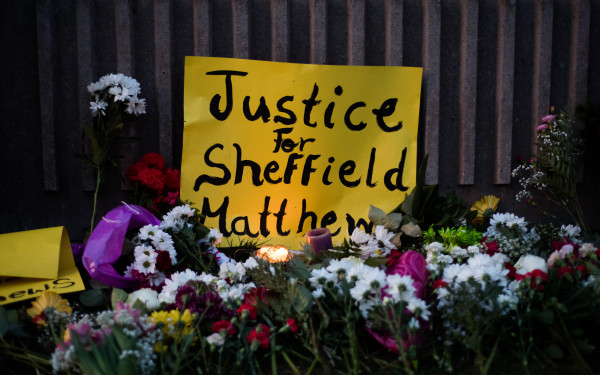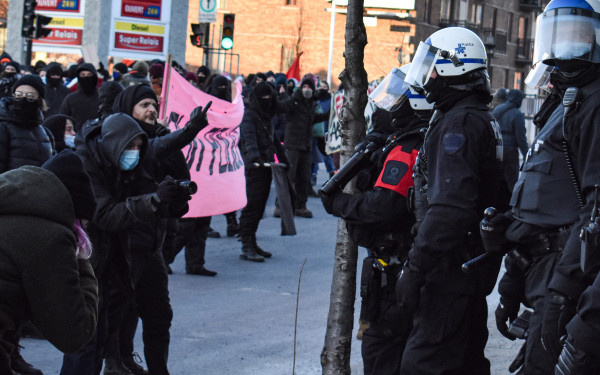Rwandan community protests death of Erixon Kabera
The father of three was killed by police on Nov. 9 in Hamilton, Ontario
The Rwandan-Canadian community mobilized to protest the death of Erixon Kabera by holding a march in Montreal on Nov. 24.
Kabera was a father and member of the Rwandan and broader African immigrant communities in Hamilton, Ontario. He was shot and killed by police on Nov. 9.
The march began near the Place-des-Arts metro station and was organized by the Montreal division of the Rwandan Community Abroad (RCA). Dozens of participants showed up in collective grief and frustration to raise their voices in support of Kabera’s family, demanding clarity regarding the circumstances of Kabera’s death.
“The pacifist march was simply to show our community's support,” said Philippe Castinera Nshuti, president of the RCA Montreal. “It was a call for justice.”
On Nov. 9, two Hamilton police officers responded to a call of a man acting in a “threatening manner” inside an apartment building. An early police statement stated that there was “an exchange of gunfire, resulting in both [Kabera] and an officer suffering gunshot wounds.” However, an updated investigation revealed no evidence that Kabera had discharged a firearm. This prompted several questions and concerns from community members regarding the handling of the incident.
“The portrait [in the media] that was shown of him at the time of his death, we all know that it was not him,” said Parfait Kayitesi, Kabera's younger brother. “It was not him; he is not capable of doing such things. […] There are many things that are unclear about what happened.”
As demonstrators moved through the streets, banners reading “Justice for Erixon” and “No justice, no peace” were waved in the air, accompanied by repeated chants of “We want justice, we want answers.” The march was a direct call for transparency, accountability, and justice from police services in Canada, particularly in their treatment of racialized communities.
“We have to stay mobilized,” said Zeinab, who has been granted last name anonymity for safety reasons. Zeinab is an activist based in Hamilton who attended the vigil in her city before travelling to Montreal to support the solidarity march.
“We have to keep demanding accountability and justice for all systems in Canada that kill Black people, Indigenous people and other people of colour,” she said. “We can’t let them get away with these things without answers, without knowing that there will be a response every time they do something horrible like this.”
Zeinab explained that even people who have never engaged in protest felt compelled to take action for Kabera’s justice, adding that this showed how loved he was by his community.
Although Zeinab did not know Kabera personally, she said that he had a profound impact on the African immigrant community in Hamilton. While reflecting on a church service held in his honour, she shared how the stories told by friends and family highlighted his generosity and commitment to others.
According to her, Kabera was often the first to welcome newcomers, meeting immigrants at the airport and ensuring they were well introduced and supported as they began their new lives in Canada.
“He was always doing more for others than himself, always putting other people above him,” Zeinab said. ”That’s what I learned from his friends, his family, his community.”
For that reason, Zeinab believes that Kabera’s death was a traumatic loss felt not only in Hamilton but across Canada and among immigrants worldwide.
“He survived genocide in Rwanda, only to be gunned down here by Hamilton police, which is a shame,” she said. “Shame!”
Jeff Ngamije, Kabera’s uncle, said that the march was not a call for the abolition of the police, but for justice. He added that the identities of the officers responsible for Kabera have not been revealed.
“We are not against the police, but we are searching for the truth about the death of our brother, our son, Erixon,” Ngamije said.
The day after his killing, Kabera was expected to return to Montreal, where he had resided before living in Hamilton. Now, instead of moving from Hamilton to Montreal, Kabera’s body is travelling from Hamilton back to Rwanda to be buried Friday, Nov. 29, according to Ngamije.
In his passing, Kabera left behind his friends, family and three sons aged 17, 13 and 10.
His loved ones are seeking continued support through their GoFundMe campaign to cover the legal fees for their ongoing fight for justice.
“This is going to be a long fight for justice, a long fight for the truth, and we need people to stay engaged,” Zeinab said. “Don’t forget Erixon’s name.”




_1_600_375_90_s_c1.jpg)

__600_375_s_c1.png)
